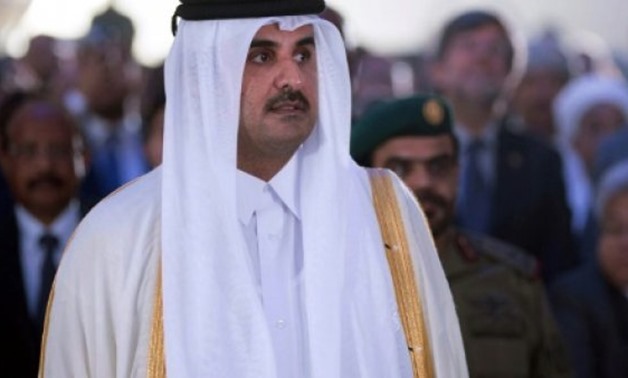
Qatar's Emir Sheikh Tamim bin Hamad al-Thani: "We do not fear the boycott of these countries against us, we are a thousand times better off without them" - AFP/Qatar News Agency
CAIRO – 1 January 2017: At the beginning of a new year, Qatar stays a source of controversy in the troubled region of the Middle East by adopting policies that put the tiny emirate in odds with its neighboring Gulf States.
On June 5, five Arab states (Egypt, Saudi Arabia, Bahrain, United Arab of Emirates and Yemen) cut off diplomatic ties with the gas-rich emirate, accusing it of supporting terrorism and interfering in the internal affairs of other countries.
The boycott is considered as one of the biggest crisis ever facing Qatar since its independence in 197.The emirate's land, Maritime and air borders with neighbors like KSA and UAE are blocked.
Qatar got involved in a lengthy diplomatic dispute with the boycotting states, in both local and international levels, even taking a challenging stance by promoting relations with Iran, the major rival of Saudi Arabia in the region.
Qatar demonstrated its persistence to sustain the agitated fuss with its Gulf neighbors by deploying Turkish forces in the capital city of Doha, and signing a defense agreement with Turkey, shortly after the diplomatic dispute with its Arab neighbors stirred.
The US tried to ease the growing tension in the region by calling Qatar to focus its efforts on battling the terrorist group of ISIS. In September, U.S. President Donald Trump declared his willingness to step in and mediate in the worst dispute in decades among the U.S.-allied Arab states and Qatar.
Qatar escalated the tension, driven by its fierce rejection for the boycotting states demands, by taking an approaching step towards the Iranian goals in the region. Iranian sources declared that Qatar’s Sheikh Tamim Bin Hamad pledged to pay a $2 billion loan to the Iranian regime to quell protests that recently erupted in Iran, according to the Qatari Opposition Coalition on their Twitter account 'Arab Mubasher'.
Despite the American urges to d-escalate the dispute, Qatar took a further step recently, when the Qatari Chief of Staff met with his Sudanese and Turkish counterparts on December 29 in the Sudanese capital of Sudan.
U.S. Defense Department called Qatar Saturday to de-escalate the tensions in the Middle East and to encourage all Gulf partners to focus their efforts on rooting out the Islamic State (IS) and facing Iran’s threats in the region.
In a Pentagon’s statement released on Saturday, U.S. Defense Secretary James Mattis spoke with his Qatari counterpart Khalid al-Attiyah on the phone to congratulate him for assuming the post, stressing the importance of de-escalating the tensions between Qatar and the Arab quartet.

Comments
Leave a Comment